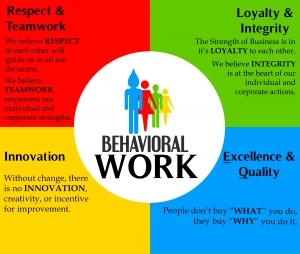
 Behavioral Work
Advocating Independence
Behavioral Work
Advocating Independence
Admin
Why I Walk for Autism Speaks
I'm walking to raise funds for the mission of Autism Speaks to fuel innovative research and make connections to critical lifelong supports and services for the autism community. Please support me by donating and help me meet my fundraising goal and you, too, can join the team and make an impact for people living with autism!
The Center for Autism and related disabilities at the Central University of Florida (UCF-CARD), always for the purpose of training the Hispanic population, and with the collaboration of the Toni Jennings Exceptional Education Institute, cordially invite you to Participate in the fifth Annual conference in Spanish HISPA Autism 2018.
The following information is not meant to diagnose or treat and should not take the place of personal consultation, as appropriate, with a qualified healthcare professional. Autism, or Autism Spectrum Disorder, refers to a range of conditions characterized by challenges with social skills, repetitive behaviors, speech, and nonverbal communication, as well as by unique strengths and differences. Many people with autism also have sensory issues. These can include aversions to certain sights, sounds and other sensations. We now know that there is not one autism but many types, caused by different combinations of genetic and environmental influences.
The term "Spectrum" reflects the wide variation in challenges and strengths possessed by each person with autism. Autism's most-obvious signs tend to appear between 2 and 3 years of age. In some cases, it can be diagnosed as early as 18 months. Some developmental delays associated with autism can be identified and addressed even earlier. Autism Speaks urges parents with concerns to seek evaluation without delay, as early intervention can improve outcomes.
The fundamental symptoms of autism are two:
- Persistent deficiencies in communication and social interaction.
- Restrictive and repetitive patterns of behavior, interests or activities.
Children with autism have trouble communicating. They have trouble understanding what other people think and feel. This makes it very hard for them to express themselves either with words or through gestures, facial expressions, and touch. A child with ASD who is very sensitive may be greatly troubled -- sometimes even pained -- by sounds, touches, smells, or sights that seem normal to others.
Children who are autistic may have repetitive, stereotyped body movements such as rocking, pacing, or hand flapping. They may have unusual responses to people, attachments to objects, resistance to change in their routines, or aggressive or self-injurious behavior. At times they may seem not to notice people, objects, or activities in their surroundings. Some children with autism may also develop seizures. And in some cases, those seizures may not occur until adolescence.
How is ASD diagnosed?
ASD symptoms can vary greatly from person to person depending on the severity of the disorder. Symptoms may even go unrecognized for young children who have mild ASD or less debilitating handicaps.
Autism spectrum disorder is diagnosed by clinicians based on symptoms, signs, and testing according to the Diagnostic and Statistical Manual of Mental Disorders-V, a guide created by the American Psychiatric Association used to diagnose mental disorders. Children should be screened for developmental delays during periodic checkups and specifically for autism at 18- and 24-month well-child visits.
Very early indicators that require evaluation by an expert include:
- no babbling or pointing by age 1
- no single words by age 16 months or two-word phrases by age 2
- no response to name
- loss of language or social skills previously acquired
- poor eye contact
- excessive lining up of toys or objects
- no smiling or social responsiveness
Later indicators include:
- impaired ability to make friends with peers
- impaired ability to initiate or sustain a conversation with others
- absence or impairment of imaginative and social play
- repetitive or unusual use of language
- abnormally intense or focused interest
- preoccupation with certain objects or subjects
- inflexible adherence to specific routines or rituals
If screening instruments indicate the possibility of ASD, a more comprehensive evaluation is usually indicated. A comprehensive evaluation requires a multidisciplinary team, including a psychologist, neurologist, psychiatrist, speech therapist, and other professionals who diagnose and treat children with ASD. The team members will conduct a thorough neurological assessment and in-depth cognitive and language testing. Because hearing problems can cause behaviors that could be mistaken for ASD, children with delayed speech development should also have their hearing tested.
Some Facts About Autism
- The Centers for Disease Control and Prevention (CDC) estimates autism's prevalence as 1 in 68 children in the United States. This includes 1 in 42 boys and 1 in 189 girls.
- An estimated 50,000 teens with autism become adults - and lose school-based autism services - each year.
- Around one third of people with autism remain nonverbal.
- Around one third of people with autism have an intellectual disability.
- Certain medical and mental health issues frequently accompany autism. They include gastrointestinal (GI) disorders, seizures, sleep disturbances, attention deficit and hyperactivity disorder (ADHD), anxiety and phobias.
Behavior Analysis is rooted in the behaviorist tradition and utilizes learning principles to bring about behavior change. Some branches of psychology strive to understand underlying cognitions, but behavioral psychology is not concerned with mentalistic causes of behavior and instead focuses on the behavior itself.
Behavior Analysis has robust practical applications in mental health treatment and organizational psychology, particularly when focused on helping children and adults learn new behaviors or reduce problem behaviors.
Behavior Analysis is a natural science that seeks to understand the behavior of individuals. That is, Behavior Analysts study how biological, pharmacological, and experiential factors influence the behavior of humans and nonhuman animals. Recognizing that behavior is something that individuals do, behavior analysts place special emphasis on studying factors that reliably influence the behavior of individuals, an emphasis that works well when the goal is to acquire adaptive behavior or ameliorate problem behavior. The science of behavior analysis has made discoveries that have proven useful in addressing socially important behavior such as drug taking, healthy eating, workplace safety, education, and the treatment of pervasive developmental disabilities (e.g., autism).
What Behavioral Work Can Do?
• Behaviors related to Autism
• Behaviors related to ADD or ADHD
• Verbal aggression
• Physical aggression
• Off-task behavior
• Defiance
• Behaviors related to developmental disability
• Find support to succeed
• Access helpful services in the community
• Build and maintain relationships
• Advocate for yourself while taking personal responsibility.
• Based on the values of human rights, independence, choice, and social inclusion.
• Designed to enable the client to direct their own services and supports, rather than attempting
to fit within service system.
• Assists the client and their families to build capacities and capabilities.
• Comprehensive planning based on what the recipient wants and needs including children/youth,
resulting in better outcomes for that individual and their family.
• Help the client determines worthwhile goals.
• Assist them in discovering their ability to attain their goals.
• Relationships are initiated and nurtured to ensure a person-centered approach to service
implementation.
• And more...
• Behaviors related to Autism
• Behaviors related to ADD or ADHD
• Verbal aggression
• Physical aggression
• Off-task behavior
• Defiance
• Behaviors related to developmental disability
• Find support to succeed
• Access helpful services in the community
• Build and maintain relationships
• Advocate for yourself while taking personal responsibility.
• Based on the values of human rights, independence, choice, and social inclusion.
• Designed to enable the client to direct their own services and supports, rather than attempting
to fit within service system.
• Assists the client and their families to build capacities and capabilities.
• Comprehensive planning based on what the recipient wants and needs including children/youth,
resulting in better outcomes for that individual and their family.
• Help the client determines worthwhile goals.
• Assist them in discovering their ability to attain their goals.
• Relationships are initiated and nurtured to ensure a person-centered approach to service
implementation.
• And more...
Our company is characterized by the transparency and honesty of the services we offer, providing peace of mind, good service and security to our customers and their families. Here at Behavorial Work all the mental health population are welcome, dare to take that big step and call us for the benefit of those people who so need our help and services, Together We Will Improve Your Quality of Life.
For persons with mental health care needs, Behavioral Work is a place for hope. From rehabilitating persons in crisis to helping teens deal with depressive disorders, Behavioral Work has evolved into one of the most comprehensive health care providers in Central Florida.
Behavioral Work offers a rim array of mental health services like Behavior Analysis, Targeted Case Management, Counseling, Psychiatric Evaluation and a variety of approaches for families wanting to improve their mental well-being.
Behavioral Work commitment to quality is reflected in every aspect of care an individual receives.
Who's Eligible for Our Services?
Adults and/or Children with the following:
- Diagnosis of a serious mental illnes, such as Autism, Schizopheria or Bipolar Disorder, ADHD, ODD, Depression, ADD and others.
- Significant difficulty independently managing responsabilities at home, at work or in the community.
- Recent psychiatric hospitilizations or frequent contacts with Crisis Services.
- Children Under 21 with Autism Spectrum Disorder
Call to learn how Behavioral Work services can help you and those you love or fill out our Referral Form by clicking here or from the link above.
**Servicing the following counties: Osceola, Polk, Orange, Lake, Seminole & Brevard
{407) 329-3464
 EN-US
EN-US  ES
ES 